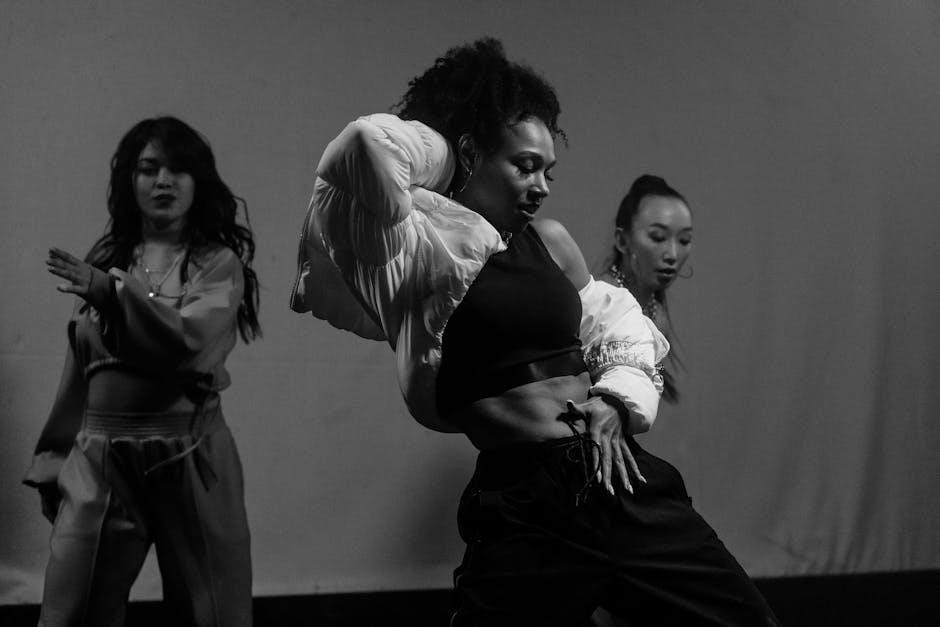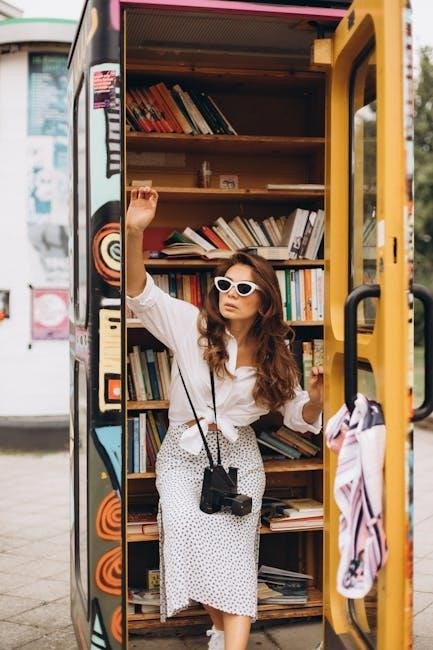
Female hip-hop artists have revolutionized the music industry, breaking barriers and redefining cultural norms through their unique voices and storytelling, inspiring future generations of musicians and fans alike.
1.1 The Rise of Female Hip-Hop Artists
The rise of female hip-hop artists has been a transformative journey, marked by resilience and creativity. From pioneers like Roxanne Shanté to modern icons such as Cardi B and Megan Thee Stallion, these artists have redefined the genre. Despite early challenges of misogyny and exclusion, women in hip-hop have carved out their own space, using their platforms to address societal issues and celebrate female empowerment. Their impact extends beyond music, influencing fashion, culture, and social movements. Books and documentaries now highlight their contributions, showcasing how they’ve reshaped the industry and inspired future generations to embrace their voices and authenticity. This evolution underscores their undeniable influence on modern hip-hop culture.
1.2 Importance of Documenting Their Contributions
Documenting the contributions of female hip-hop artists is crucial for preserving their legacy and ensuring their influence is recognized. Books, such as The Motherlode: 100 Women Who Made Hip-Hop, provide in-depth insights into their journeys and cultural impact. These works not only celebrate their achievements but also serve as educational tools, inspiring future generations. By chronicling their stories, we honor their role in shaping the music industry and challenging gender norms. This documentation also fosters a deeper understanding of hip-hop’s evolution and the pivotal part women have played in its growth, ensuring their contributions remain integral to the genre’s history and ongoing narrative.

The Process of Booking Female Hip-Hop Artists
Booking female hip-hop artists involves thorough research, selecting the right talent, negotiating costs, and understanding logistical and legal requirements to ensure a smooth and successful event experience.
2.1 Researching and Selecting the Right Artist
Researching and selecting the right female hip-hop artist involves understanding their style, reputation, and audience engagement. Look for artists whose music aligns with your event’s theme and budget. Check their discography, live performances, and social media presence to gauge their appeal. Consider emerging talents like Megan Thee Stallion or established icons like Nicki Minaj, ensuring their availability and fit for your event. Personal branding and cultural impact are also crucial factors to evaluate. By matching the artist’s vibe with your event goals, you create a memorable experience for attendees and foster meaningful connections with the audience.
2.2 Understanding Booking Costs and Negotiations
Booking costs for female hip-hop artists vary widely, depending on their fame, demand, and event type. Factors include performance fees, travel expenses, and equipment requirements. Negotiations often involve promoters, managers, and legal teams to ensure mutually beneficial terms. Be prepared to discuss rider details, such as sound systems and backstage needs. Payment structures may include deposits and installments, with penalties for cancellations. Transparent communication and flexibility are key to securing talent while staying within budget. Understanding these dynamics helps organizers navigate the financial and logistical aspects of booking successfully.
2.3 Legal and Contractual Considerations
Booking female hip-hop artists requires careful attention to legal and contractual details. Performance contracts must outline terms like payment, intellectual property rights, and cancellation policies. Riders specifying technical and hospitality requirements are essential. Ensure compliance with labor laws and venue regulations. Indemnification clauses protect both parties from liability. Payment terms, including deposits and final balances, should be clearly defined. Contractual breaches can lead to legal disputes, so thorough negotiation and legal review are crucial. Understanding these aspects ensures a smooth and legally binding agreement, safeguarding both the artist and the organizer.

Preparing for the Event
Ensuring technical setups, soundchecks, and promotion strategies are in place guarantees a seamless experience for both artists and attendees, fostering an engaging and memorable hip-hop event atmosphere.
3.1 Technical and Logistical Requirements
Booking female hip-hop artists requires meticulous planning of technical and logistical details to ensure a smooth event. This includes arranging high-quality sound systems, lighting, and backline equipment tailored to the artist’s specifications. Venue selection should consider capacity, acoustics, and accessibility. Power supply and internet connectivity must be reliable for digital setups. Stage design should reflect the artist’s brand and performance style. Additionally, coordinating load-in and soundcheck times is crucial. Ensuring a skilled technical team is present to handle setups and troubleshoot issues guarantees a professional experience. Advance communication with the artist’s team about specific requirements helps prevent last-minute challenges and ensures the event runs seamlessly from start to finish.
3.2 Promoting the Event Effectively
Promoting an event featuring female hip-hop artists demands a strategic approach to maximize visibility and engagement. Leverage social media platforms like Instagram, TikTok, and Twitter to share engaging content, such as artist interviews, behind-the-scenes glimpses, and event teasers. Collaborate with influencers and bloggers to reach wider audiences. Utilize email marketing and targeted ads to appeal to fans of similar artists. Highlight the artist’s unique style and contributions to hip-hop culture in promotional materials. Partner with local radio stations and music blogs for interviews and features. Create a hashtag campaign to foster community engagement and build excitement. Ensure consistent branding across all platforms to maintain a cohesive and impactful promotional strategy.

The Role of Female Hip-Hop Artists in Modern Culture
Female hip-hop artists are reshaping modern culture by challenging stereotypes, promoting gender equality, and inspiring social change through their music and unapologetic self-expression.

4.1 Their Impact on the Music Industry
Female hip-hop artists have significantly transformed the music industry by challenging stereotypes and pushing boundaries. Their rise has led to greater diversity and representation, inspiring a new wave of talent. Books like The Motherlode: 100 Women Who Made Hip-Hop highlight their contributions, showcasing how they’ve redefined genres and cultural narratives. By addressing themes like empowerment and identity, these artists have created a space for authentic storytelling, influencing both lyrical content and industry practices. Their success has also prompted discussions on gender equality, personal branding, and the evolution of hip-hop culture, proving their lasting impact on the music world and beyond.
4.2 Representation and Empowerment Through Music
Female hip-hop artists have become powerful voices for representation and empowerment, using their music as a platform to challenge societal norms and stereotypes. By addressing themes of identity, gender, and race, they inspire countless individuals, particularly women and marginalized communities. Books like The Motherlode: 100 Women Who Made Hip-Hop and studies on hip-hop feminism highlight their role in redefining cultural narratives. Their music fosters resilience and self-confidence, creating a space for authenticity and inclusivity. Through their artistry, these artists not only break barriers but also pave the way for future generations to embrace their identities and demand equality in the industry and beyond.

Post-Event Management
Post-event management involves evaluating success, gathering feedback, and maintaining relationships with artists and attendees, ensuring future collaborations and fostering long-term connections within the hip-hop community.
5.1 Evaluating Event Success
Evaluating the success of an event featuring female hip-hop artists involves assessing attendance, audience feedback, and overall engagement. Metrics such as ticket sales, social media buzz, and post-event surveys provide valuable insights. Additionally, the cultural impact, such as fostering dialogue on representation and empowerment, should be considered. Success also lies in how well the event highlighted the artists’ contributions to hip-hop, challenging stereotypes and inspiring future generations. By analyzing these factors, organizers can refine strategies for future events, ensuring continued support for female artists and their influence on modern culture.
5.2 Maintaining Relationships with Artists
Maintaining strong relationships with female hip-hop artists is crucial for long-term collaboration and mutual growth. Open communication, respect, and professionalism form the foundation of these partnerships. Regular check-ins, understanding their creative vision, and offering support can foster trust and loyalty. Providing platforms for their work and celebrating their achievements strengthens the bond. Building a network of collaboration ensures artists feel valued and empowered. This approach not only benefits the artists but also enhances the organizer’s reputation and future opportunities, creating a win-win scenario for all parties involved.

The Future of Female Hip-Hop
The future of female hip-hop is promising, with emerging talents and technological advancements paving the way for greater innovation, representation, and global empowerment in the music industry.
6.1 Emerging Trends and New Talent
The hip-hop landscape is witnessing a surge in female artists who are redefining the genre with fresh perspectives and bold creativity. New talents like Megan Thee Stallion and Coi Leray are breaking barriers, blending lyrical prowess with unapologetic authenticity. Digital platforms have become a launchpad for these artists, enabling them to bypass traditional gatekeepers and connect directly with global audiences. Collaborations with established acts and innovative production styles are fostering a vibrant, inclusive ecosystem. Their rise underscores a cultural shift, where women are no longer sidelined but celebrated as central figures in hip-hop’s evolution, paving the way for a future rich with diversity and artistic excellence.
6.2 The Role of Technology in Booking and Promotion
Technology has transformed how female hip-hop artists are booked and promoted, offering unprecedented opportunities for global reach. Digital platforms like social media, streaming services, and online booking agencies enable direct connectivity between artists, promoters, and fans. Algorithms and data analytics help target audiences more effectively, ensuring tailored marketing campaigns. Virtual concerts and livestreams have also become pivotal, allowing artists to perform remotely and expand their fanbase. Additionally, digital tools facilitate easier communication and negotiation between artists and promoters, streamlining the booking process. This technological evolution not only enhances visibility but also empowers female artists to maintain creative control and engage with fans on a deeper level.
The rise and impact of female hip-hop artists underscore their transformative influence on music and culture. Through resilience and creativity, they have challenged industry norms and inspired countless individuals. Their contributions, documented in various books and studies, highlight the importance of representation and empowerment. As technology continues to evolve, their ability to connect with global audiences and maintain artistic control will only grow stronger. Celebrating these artists not only honors their achievements but also paves the way for future generations to thrive in the hip-hop world.